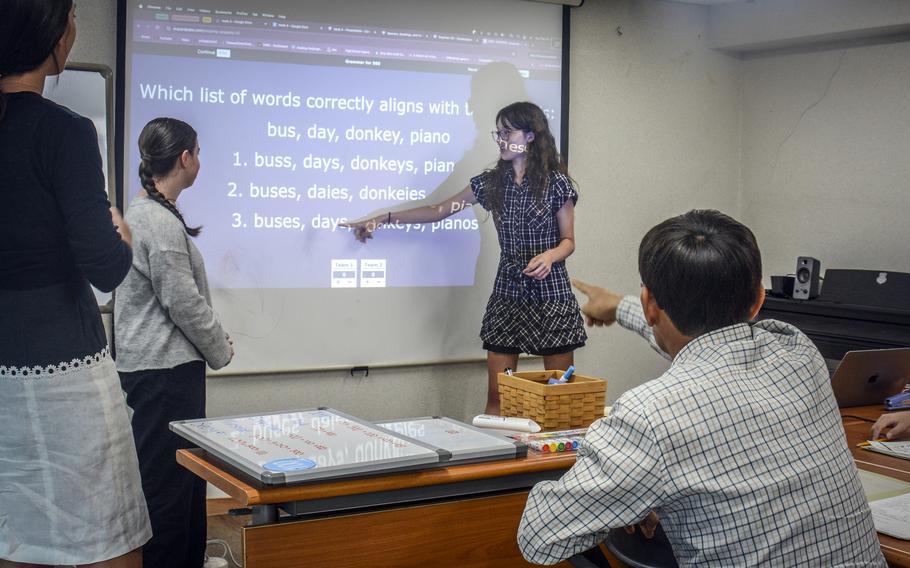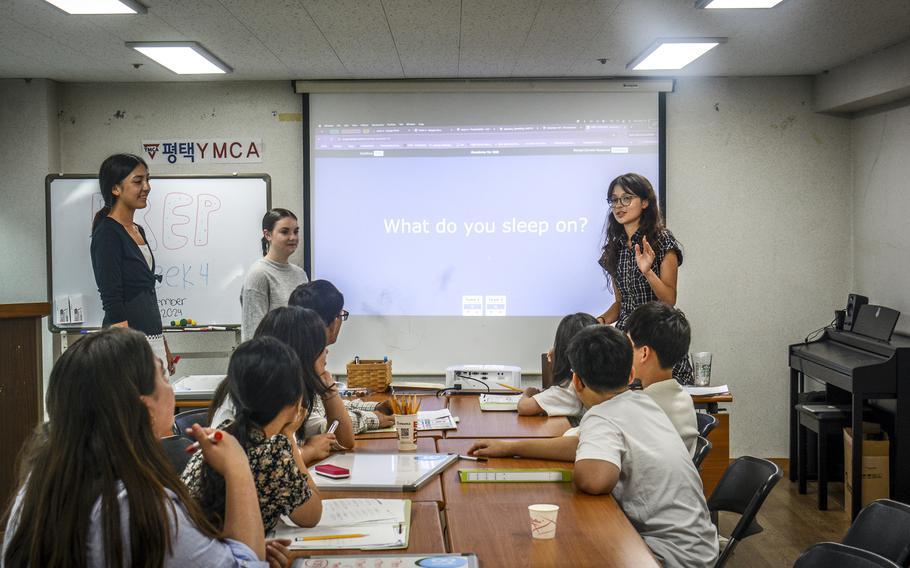
Jenna Reynolds, 17, of Camp Humphreys, teaches English to North Korean defectors at the YMCA in Pyeongtaek, South Korea, Sept. 22, 2024. (Luis Garcia/Stars and Stripes)
PYEONGTAEK, South Korea — A group of North Korean defectors were puzzled by rows of blue squares projected onto a screen during a recent English class in this city 40 miles south of Seoul.
“What is this?” one of the eight defector-students asked of the “Jeopardy”-style game designed to quiz them on their vocabulary.
Their American instructor, Jenna Reynolds, 17, of nearby Camp Humphreys, took a few minutes to explain the rules to her befuddled students, who’d never heard of the classic American gameshow.
“Just choose a square,” she told the North Koreans, some of whom were still confused about the rules.
The free English classes for North Korean defectors, known as the Preparing Refugees in English Project, were founded last year by Reynolds, a senior at Humphreys High School and the daughter of a retired soldier living on base.
Volunteers from Camp Humphreys teach the two- to three-hour classes once per week to up to 15 defectors at the YMCA in Pyeongtaek. Many of the students cite their lackluster proficiency in English as a barrier in school or finding work, Reynolds said.
“Some of the students want to learn how to have basic conversations,” she told Stars and Stripes at the center last month. Others want to learn about the United States because they were forcibly taught in North Korea to view Americans as “the enemy.”
Around 34,100 North Koreans have defected to the South since 1998, the South’s Ministry of Unification reported in June. More than 100 North Koreans have crossed the inter-Korean border so far this year, 90% of them women, the report said.
Pyeongtaek’s YMCA, also known as the Y, provides after-school programs and social services to roughly 1,200 defectors and their children living in and around the city that also hosts America’s largest overseas military base, branch supervisor Heoh Yong-rim said in a Sept. 22 interview at the center.
The Y is a “safe space for North Korean defectors,” and those attending the English classes also learn about American culture, Heoh said.
Reynolds teamed with the Y to organize a trip for defectors to tour Humphreys and join Fourth of July festivities inside the base this year.
Defectors interviewed for this report asked to be identified only by their surname due to safety concerns for themselves and family members still in North Korea.

Jenna Reynolds, 17, of Camp Humphreys, teaches English to North Korean defectors at the YMCA in Pyeongtaek, South Korea, Sept. 22, 2024. (Luis Garcia/Stars and Stripes)
Park, 27, defected in 2020 and has been taking the English classes for two months in preparation for college.
“It’s been somewhat difficult living in South Korea because people use a lot of English here,” Park, who plans to study business administration next year, said at the Y on Sept. 22. “The conversations haven’t always been smooth.”
North Korean defectors are given housing, counseling, employment and monetary support by the South Korean government. The majority, 79.3%, said they were satisfied with living in the South, according to a survey of 2,500 defectors in 2023 by the Korea Hana Foundation, a nonprofit founded by the Ministry of Unification.
But many defectors say they have difficulty adjusting to their new life. According to a yearlong survey released in December by the Seoul Institute, 69.4% of defectors living in Seoul said they have struggled to provide for themselves.
Nearly 60% reported they could only afford monthly expenses of less than $730, and 37% say they still receive some sort of government financial aid.
On Oct. 1, a North Korean defector living in Seoul stole a bus and attempted to cross into North Korea at a bridge border crossing. Apprehended by border guards and questioned by police, he said he had difficulty making a living in the South.
“I think it’s hard for them to get accustomed to South Korean culture,” Heoh said. “A lot of North Koreans do not want to portray themselves as North Koreans, but the accent and terminology sometimes comes out while speaking.”
Sung, a 57-year-old apartment management administrator who has been living in the South for a decade, said he attends the Y classes because “learning English is fun.”
He hopes to use his newfound knowledge to converse with foreigners in Pyeongtaek and visit the United States or Canada someday, he said at the Y on Sept. 22.
“I’m learning a lot here,” he said. “My speech and accent are getting better, but I’m even more comfortable listening and understanding words in English now.”